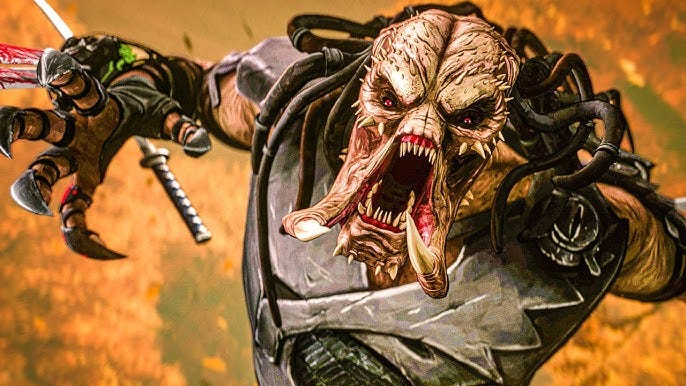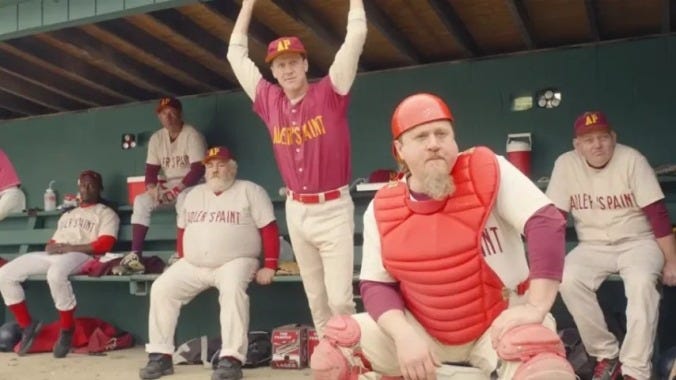My original plan for this week was to review the new John Wick spin-off Ballerina, but the screening conflicted with my son’s baseball game. We’re in that time of year where there’s so much out but life outside the movies is also extremely busy, so some things just might not get covered until later.
But, I’ve also been busy watching things at home. Some of that, you’ll read about next week in my continued Summer of 1995 series and some other pieces. But I wanted to single three films out today for some mini reviews.
Predator: Killer of Killers
In 2022, director Dan Trachtenberg breathed new life into the moribund Predator franchise with Prey, a bone-crunching thriller that pitted the intergalactic game hunter against a Comanche warrior in 1700s North America. The film was a smart and action-packed invigoration of the saga, so much so that Trachtenberg’s future-set follow-up, Badlands, will get the big-screen release later this year that Prey was denied.
Before that, though, Trachtenberg and co-director Joshua Wassang have collaborated on the animated anthology Predator: Killer of Killers, available now on Hulu and Disney+. A violent and fun bit of sci-fi action, it continues to prove that there’s still green blood pumping in this saga’s veins.
Where fellow sci-fi franchise Alien tends to include a bit more philosophy and respectability, Predator’s delights have always been a bit more primal. Each comes down to the same question: What badass fighter could take down the ultimate killer? An elite commando unit? A warrior woman? A serial killer? Danny Glover? The franchise’s appeal is in horror-tinged survival and blistering action.
Killer of Killers feels like schoolyard Predator fan fiction, but done with brains and style. What if a Predator took on a Viking clan? Samurai? World War II bomber pilots? That’s pretty much the hook. In three separate stories, different Predator warriors take on the toughest and smartest human fighters, with a final story tying it together and setting up potential future installments. Each story has its own internal conflicts, with the humans dealing with their own dilemmas, rivalries or drama that’s interrupted by an interplanetary threat. The animation looks great, the action is inventive and energetic, and I appreciate the approach (although I might have liked one entry about the Predator fighting a non-human opponent).
All of the episodes are solid, although as in any anthology, your mileage will vary on favorites. I personally think the second episode – set in feudal Japan – is the best, with the most sumptuous visuals and an almost complete lack of dialogue. By the third entry, the formula starts to feel a bit familiar, although the final act has some clever twists. It never approaches the experimentalism or ambition of something like The Animatrix, but it should satisfy fans and hold them over until Badlands arrives this fall.
Predator: Killer of Killers is streaming on Hulu and Disney+.
Eephus
Those looking for a thrilling sports drama might not be the right audience for Eephus. But patient viewers who celebrate baseball, the quirks of its players and its philosophical underpinnings might find something special.
Eephus takes place over one fall day as a group of men play a final game at a community ballpark before it’s razed to make way for a new school. The film starts with the arrival of scorekeeper Franny (Clif Blake) and follows the course of the game. The score doesn’t really matter, and we don’t really get a lot of looks at any plays. Instead, the film meanders – much like the pitch that gives the movie its name – and rolls along to observe the players hanging in the field or chatting in the dugout, the random onlookers who occasionally come to watch (and jeer), and the food truck dude. Local radio ads occasionally provide the soundtrack, punctuated by quotes about the game and, most importantly, the crack of the bat.
Eephus’ pace might be too stultifying for some. But those who give themselves over to its languid pacing will find something special, perhaps occasionally deep. The dialogue is often very funny, and Lund gives just enough information about their relationships and life off the diamond to suggest what might be driving them. No character is fully realized, but the overall picture is one of men with their own insecurities, frustrations, fears and failures who come to the park because it gives them a release, a focus, a chance to be a hero. It’s different for everyone. As the game progresses and the light fades, there’s a palpable sense of loss at what’s being taken away.
The film works as a celebration of the game and the tangible pleasures of just being out with the guys. But it also suggests a sense of struggle and loss that sticks to the ribs, and occasionally loops its way into profundity. At one point, a character says, “I’m looking around for something to happen and, poof, game’s over.” Is he talking about baseball or life? Is there a difference? This is quietly one of my favorite films of the year.
Eephus is available to purchase and rent on most digital platforms.
Pee-Wee as Himself
I was the right age for Pee-Wee Herman mania, although I don’t know that it ever infected me as deeply as it did my peers. Still, I don’t know that it’s possible to overstate how omnipresent he was in pop culture. Adults loved the character for its nostalgic and camp appeal, and kids gravitated toward him because he was one of us. Pee-Wee was a fixture in all mass media.
I don’t think I ever once questioned whether Pee-Wee was a real person. When Paul Reubens, the performer who created him, was arrested for public indecency, it was the first time I considered that there was someone behind the bow tie and gray suit. That’s a big part of the themes behind Pee-Wee as Himself, Matt Wolf’s two-part HBO documentary centered around lengthy interviews with Reubens.
The first half focuses on Reubens’ upbringing and his time with the comedy troupe The Groundlings, where he developed the Pee-Wee Herman character. It follows the ascending popularity of the character, Reubens’ choice to put his personal life on hold for the sake of success, and taking Pee-Wee into the stratosphere with Tim Burton’s movie. The second part is a tougher and more difficult watch, starting the the creation of “Pee-Wee’s Playhouse” – which belongs on a short list of the best children’s programs alongside The Muppet Show and Sesame Street – before addressing the arrests that derailed his career (which, the documentary makes a strong case, were largely trumped up), and his end-of-career comeback. The treasure trove of videos and photos from throughout Reubens’ career is astonishing, and it’s a testament to just how committed to the character the performer was.
Wolf interviewed Reubens for nearly 40 hours in the years prior to the performer’s death (Reubens withheld any information about his cancer diagnoses), and the result is a fascinating and tense wrestling for control. Reubens can be prickly and evasive, and near the end stops speaking completely with the director until just before his death. It makes for a compelling watch, and there’s a mischievousness to Reubens’ battle for control that feels very Pee-Wee-like.
I appreciate the film for making the argument that Reubens was a true artist without shying away from the harsher elements of his story. Reubens, for the first time, publicly confirms that he was a gay man, and it’s sad to consider just how much of his life he had to suppress because the public wouldn’t accept him. I wish Reubens had answered more questions about his arrests, but it’s obvious that the events were heartbreaking for him; I’m glad that before he died he was able to make a bit of a comeback – the Netflix movie Pee-Wee’s Big Holiday is actually a lot of fun. I’m happy this exists.
Pee-Wee as Himself is streaming on HBO Max.








